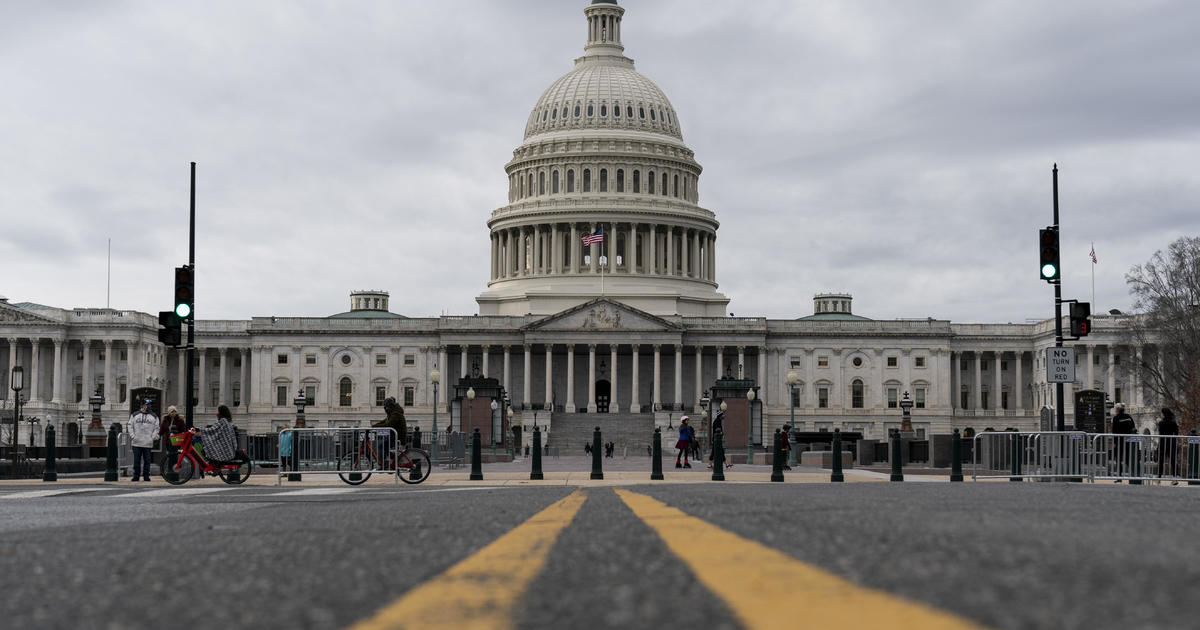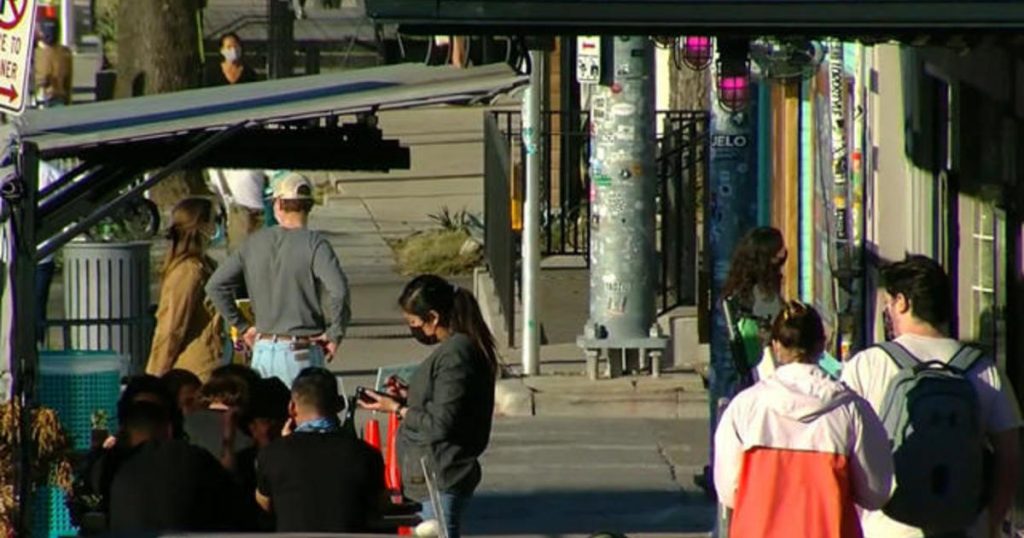
Washington — The “vote-a-rama” for President Biden’s $1.9 trillion coronavirus relief package, a grueling but typically straightforward Senate process of voting on a series of amendments, was derailed on Friday by disagreements within the Democratic caucus over an unemployment insurance benefit. The unexpected stalemate raised questions about when the final bill will pass and whether the new majority will be able to implement its priorities in the long term.
Senate Democrats reached a deal accepted by Senator Joe Manchin, the lone Democratic holdout, shortly before 8 p.m., after Manchin had an extended meeting with Senate Majority Leader Chuck Schumer. Under the new deal, Senate Democrats will now offer an amendment to extend additional unemployment insurance benefits through September 6 at $300 per week. The amendment would also make the first $10,200 of unemployment insurance benefits non-taxable for households with incomes under $150,000, and extend tax rules regarding excess business loss limitations to 2026.
This is almost identical to an amendment proposed under a deal reached Friday morning by progressives and moderates, with the only change being the income limit for the non-taxable benefits.
“The President has made it clear we will have enough vaccines for every American by the end of May and I am confident the economic recovery will follow. We have reached a compromise that enables the economy to rebound quickly while also protecting those receiving unemployment benefits from being hit with unexpected tax bill next year,” Manchin said in a statement announcing his support for the compromise.
Manchin, a moderate Democrat from West Virginia, has taken on the role of being one of the deciding votes in an evenly divided Senate. Democrats have 50 seats, meaning that there is no room for error, as losing support from a single senator would mean losing the overall vote. Earlier in the day, Manchin had appeared to lean towards supporting an amendment introduced by GOP Senator Rob Portman cutting the UI benefit from $400 to $300 and only extending it through June.
The “vote-a-rama” began with a failed vote on an amendment proposed by Senator Bernie Sanders that would have raised the federal minimum wage. But the vote stayed open even after all senators had voted, preventing the next amendment from being considered, as Democrats scrambled behind the scenes to convince Manchin to support their amendment.
The deliberating is a bad omen for Schumer, the newly minted majority leader, as the “vote-a-rama” is test of his ability to keep his caucus in line.
“We need to get this done. It would be so much better if we could in a bipartisan way, but we need to get it done,” Schumer said in a speech on the Senate floor on Friday. “We are going to power through and finish this bill however long it takes. The American people are counting on us and our nation depends on it.”
The Senate convened on Friday morning with two hours of debate, followed by a vote on Sanders’ amendment, which would have raised the untipped minimum wage to $15 per hour by 2025, and the tipped minimum wage to $14.75 over seven years. The Senate parliamentarian ruled last week that the Senate could not include a provision raising the minimum wage to $15 under budget reconciliation rules, so GOP Senator Lindsey Graham raised a point of order challenging the amendment.
Manchin, as well as Democratic Senators Jon Tester, Jeanne Shaheen, Kyrsten Sinema, Chris Coons, Tom Carper and Maggie Hassan, joined Republicans in voting against allowing the provision to be included. Senator Angus King, an independent who caucuses with Democrats, also voted against adding the minimum wage hike to the bill. Manchin and Sinema in particular had previously expressed their opposition to raising the minimum wage to $15.
Although budget reconciliation rules allow for up to 20 hours of debate ahead of the “vote-a-rama,” Republicans and Democrats only used two. After GOP Senator Ron Johnson forced the Senate clerk to read the entire bill aloud, a process which took almost 11 hours, Democratic Senator Chris Van Hollen asked shortly after 2 a.m. for debate to be limited to three hours when the Senate reconvened. As there was no objection from Republicans, the agreement was made and the Senate gaveled out.
Congress is using the budget reconciliation process to pass the bill, which limits time for debate and allows legislation to pass with a simple majority, a workaround that avoids the 60-vote threshold that most bills require to advance in the Senate. If every Democrat supports the final bill, with Vice President Kamala Harris casting a tie-breaking vote, it would pass without any Republican support.
But Republicans are critical of the size of the bill and frustrated that Democrats are using the reconciliation process, arguing that they are taking a partisan route rather than working across the aisle. Democrats reply that they don’t need to waste time negotiating with Republicans to reach the 60-vote threshold and pass a smaller package.
In retaliation, Republican senators aim to make the debate and amendment process politically painful for Democrats. The most excruciating part of the process is the “vote-a-rama,” wherein senators will vote on dozens of amendments in quick succession. “Vote-a-ramas” typically take several hours, often ending early in the morning.
Republicans could also again offer an amendment to prevent undocumented immigrants from receiving stimulus checks. During the “vote-a-rama” last month on the budget resolution to set up the reconciliation process, eight Democrats joined all Republicans in voting for the amendment, infuriating progressives.
Amendments require support from a simple majority to be added to the bill, and most amendments proposed by Republicans are expected to fail. It’s also unclear how long Republicans will be willing to propose amendments that are unlikely to succeed before the final vote.
“At some point people are going to say, ‘I’m tired and I’m getting out of here,’ which is pretty powerful when you’re talking about a 50-50 Senate,” Republican Senator John Cornyn told reporters when asked what the timeline for the “vote-a-rama” would be.
The legislation is broadly popular, with recent polling showing that a majority of Americans support it, particularly the provision that provides $1,400 in direct checks to earners making under $75,000. Senate Democrats reached a deal to limit the eligibility for who receives direct checks earlier this week.
The House passed a version of the bill last week, but the measure considered by the Senate will be different. Some recently added measures, according to a Senate Democratic aide, include $510 million for FEMA and $750 million for states and communities impacted by job and revenue loss in the tourism, travel and outdoor recreation sectors. Another provision sets aside funding for education, including $1.25 billion for evidence-based summer enrichment, $1.25 billion for after school programs and $3 billion for education technology. It would also make COVID-19 student loan relief tax-free.
A vote on the motion to proceed to debate on the bill succeeded in a party-line vote on Thursday afternoon, with Harris breaking the 50-50 tie. Senator Lisa Murkowski, a Republican from Alaska who had said she is undecided about whether she will vote for final passage, voted against moving forward with debate.
Jack Turman contributed reporting.

